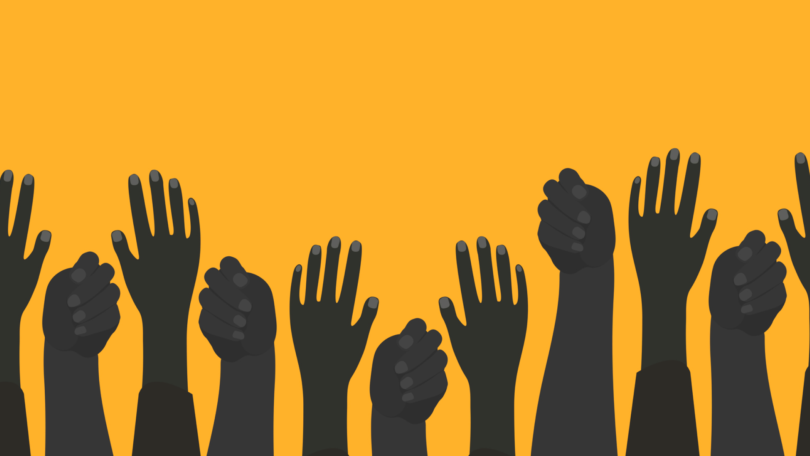Ways neighbors can celebrate and honor Juneteenth
Last updated on June 16, 2022
DeJuana L. Thompson is a political and social strategist providing innovative and sustainable engagement methods and models for candidates, campaigns, and community organizations. She is a founding partner with Think Rubix, a social innovation consultancy which helps nonprofits, businesses, and governments to engage in systems change to harness the transformative power of culture. DeJuana was recently named the Interim President and CEO of the Birmingham Civil Rights Institute. The Birmingham Civil Rights Institute, part of the Birmingham Civil Rights National Monument and an affiliate of the Smithsonian Institution, is a cultural and educational research center that promotes a comprehensive understanding of the significance of civil rights developments in Birmingham. She is also the founder of Woke Vote, an organization designed to engage, mobilize, and turnout African American voters in the South through campus and faith-based outreach, strategic media outreach, culturally relevant GOTV efforts and training for organizers.
It’s impossible to imagine their state of mind when they heard that the rumors were true.
In 1863, during the American Civil War, President Abraham Lincoln issued the Emancipation Proclamation, which declared more than three million slaves living in the Confederate states to be free. More than two years would pass, however, before the news reached African Americans living in Texas. It wasn’t until Union soldiers arrived in Galveston, Texas, on June 19, 1865, that the state’s residents finally learned that slavery had been abolished. They were free. But what does freedom mean when you, your community, and your home aren’t yet safe and secure?
Regardless of what might come next, formerly enslaved people in Galveston celebrated after the announcement. The following year, freedmen in Texas organized the first of what became the annual celebration of “Jubilee Day” on June 19. Early celebrations were used as political rallies to give voting instructions to newly freed slaves. The holiday we now know as Juneteenth arose out of these festivities, and spread beyond Texas as a day for everyone in this country to remember and reckon with our painful history.
Juneteenth became a federal holiday in June 2021, and countless communities across the country recognize it through various events, including parades, concerts, speaker series, etc. However, the underlying significance can’t be lost. In the country’s ongoing effort to increase awareness around Black lives and what protects them, it’s crucial that we also bring to light the relevance of this holiday to current events.
Home, to me, is a verb. It’s the act of participating in the living conditions and surroundings in my daily life, and the act of collectively accumulating some of my most treasured possessions. Community, then, is a natural outgrowth of what I value in my house. Those surroundings, those collective precious memories and traditions coming together to recognize that we are stronger together, better together, and create our home together.
Some authentic steps have to be taken to ensure that everyone gets to be home — to be part of a community devoted to thriving and living safely. As neighbors, we can and must all participate in this action in our homes, workplaces, and communities. Here are some of the ways you can celebrate and honor Juneteenth this year:
In the office
- Make Juneteenth a company-wide effort. As our nation undergoes a long-overdue reckoning with what it means to be inclusive, you should encourage everyone at your organization to get involved in this holiday. This helps your workplace remember that diversity and inclusion is a community effort, and everyone has their role to play in advancing change. Highlight support groups that are available.
- Take the opportunity to discuss how your company is taking action on diversity plans, and make concrete plans. Diversity and inclusion is a year-long effort, but on holidays like Juneteenth, it’s especially important for your folks to understand the tangible steps you’re taking to make your environment safer and more equitable for Black Americans. Talk is cheap, and people can and WILL check your receipts, so make sure you’re actually walking the walk. You need your people to know that race, gender, religion, ability, and sexual identity will never be barriers to their success.
- Get creative. There’s a ton of different ways to engage, but the important thing is to celebrate. Host an office event, decorate your office with Juneteenth flags and colors, serve traditional Juneteenth fare like strawberry soda and red velvet cake, bring in guest speakers, and invite your folks to outside the office events to share the celebration together.
At home
- Teach your little ones. Juneteenth honors the immediate end to slavery, and is considered the longest running African American holiday. Each generation bears the scars from our previous generations of this trauma, but with each successive one, we also find new ways to heal and move forward together. Inviting kids to understand our past is just as important as collaborating on a new future – their future.
- Gather the family together for a special meal. Cook a meal that honors the historical context of Juneteenth, decorate your table, and plan to discuss together what this holiday means for you, your community, and our country. Handy tip: red foods are customary for Juneteenth!
- Plan activities that honor Black American culture. There’s no shortage of ways to get the whole family hands-on for this holiday: find some Juneteenth trivia, create African flags together, share African-American folktales, sing old African-American songs and hymns, and honor the roots of contemporary Black culture and reflect together on its influence on our collective national culture today.
In your neighborhood
- Volunteer at and/or attend local Juneteenth events. Countless cities across the country celebrate Juneteenth with parties, concerts, and festivals, and many of these have moved online in light of COVID-19. If you are vaccinated and can participate safely in-person, then by all means do so, but you can absolutely find virtual events to help you and yours celebrate safely as well.
- Seek out and support Black-owned businesses and organizations. This isn’t just for Juneteenth – uplifting Black entrepreneurs should be a year-round commitment. Economic equality is unfortunately still very far out of reach for many Black Americans, and it is inseparable from our collective freedom. Find a directory of apps and businesses at WeBuyBlack.com
- Encourage reading. There’s a ton of resources out there for books, articles, and family-friendly stories that can further educate the whole family on Juneteenth. Here’s just one short list.
This Juneteenth, we have a rare opportunity. We can think about not only what home meant in the past, but what home can mean in the future. Do we build harmony, and community by learning about what binds us together? Or, do we repeat actions of fear and insecurity, built to drive us apart. To start, we can reflect on the generations celebrating for their newfound freedom. We can honor their struggles, and continue to build a tomorrow better than our yesterdays.
That much, more and anything, is possible.
At Nextdoor, diversity, inclusivity and belonging are core to our purpose of creating a kinder world where everyone has a neighborhood they can rely on. For Juneteenth, we implemented a logo variation to honor and bring awareness to the abolishment of slavery in the U.S.
How are you commemorating Juneteenth in your neighborhood? Share some inspiration with neighbors on Nextdoor.
To connect with your local neighborhood, download the Nextdoor app or login at nextdoor.com.



